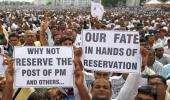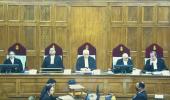'...it gets a survey report that they are going to lose elections.'
'The fear of losing elections will make them immediately conduct a caste census.'

The last published census for the Other Backward Castes was in 1931, which said that OBCs then numbered 52 per cent of India's population.
In post-Independence India, this practice was discontinued because the then prime minister Jawaharlal Nehru found it inappropriate to count India's population on the basis of caste.
When the Mandal Commission report was implemented in 1993, there were 1,663 OBCs in the list.
By 2016, the OBC list increased by over 1,000 to 2,606.
In 2011, a caste census was conducted by Dr Manmohan Singh's United Progressive Alliance government, but that report was never published.
Prime Minister N D Modi's government in 2018 said it would publish a caste census report, but backtracked later.
Bihar Chief Minister Nitish Kumar has now initiated the first caste census in his state.
Nitish Kumar's move to conduct a census of castes in Bihar is interpreted by some political observers as as a way to halt the Bharatiya Janata Party's Hindutva-propelled election momentum.
Does a census of Hindu castes matter in the 21st century?
Syed Firdaus Ashraf/Rediff.com spoke to Justice V Eswaraiah, former acting chief justice of the Andhra Pradesh high court and former chairperson of the National Commission for Backward Classes, to know more.
The concluding segment of a two-part interview:
But aren't we dividing the country on caste lines?
This is a false notion. An OBC caste census is not dividing the nation, but uniting. If every community progresses in life and gets equal opportunity, then the society that is formed will be in harmony.
If we don't give equal opportunity, then the country gets divided and this is how Naxalites are born. The atrocities of landlords and rich people saw the birth of Naxals in the Naxalbari area of West Bengal.
The upper caste rulers want to divide and rule and when we talk of proper representation of OBCs in power, they talk as if we are dividing the country. Go to any European country and you will find out that there is representation of every community as each community has been given equal opportunity.
It is only in India which is following till date Brahmanical oligarchy. They have clearly demarcated the castes which are going to do labour jobs forever as they are going to be rulers forever.
In 2018, the Modi government said it will conduct a caste census in India. Why did it back out?
The Modi government will favour a caste census provided it gets a survey report in advance that they are going to lose elections. The fear of losing elections will make them immediately conduct a caste census.

p class="rbig">The reservation problem has not been solved since the Kalelkar Commission was constituted in the early 1950s.
The Kalelkar Commission identified socially and educationally backward classes (other backward classes) under Article 340.
The Kalelkar Commission was not accepted because he himself changed his mind on his report. But when all states of India were pressurising the Centre to identify socially and educationally backward classes, Pandit Nehru wrote a letter to them in 1961.
In the letter he said it is not the policy of government to conduct census of socially and educationally backward classes for the purpose of providing any reservation.
However, he said the states had the liberty to identify OBCs and provide reservations.
Therefore, from 1961 onwards, every state appointed their own commissions and identified their own social and economically backward castes.
Tamil Nadu (then Madras state), however, started much prior to that. Pressure was built up in 2010 and Parliament decided to set up a socio-economic caste census for OBCs in 2011. They counted this separately. They did collect the data, but that information was not published. And therefore, the tussle is going on.

You were appointed chairman of the National Commission for Backward Classes in 2013. What did the government tell you to do?
The government wrote to me to categorise the backward classes and I told them without caste census data it will be difficult. I told them to publish the caste census, but they did not.
Arvind Panagariya was then appointed with an expert body to sort out the vast database of castes, sub-castes and come out with a headcount of India's population by caste. Later, it was proved that this entire exercise was a bluff.
Can a state government conduct a caste census?
The chief minister of Bihar, Nitish Kumar, made a law to enumerate particular class/data of all the castes and communities, particularly the socially and economically backward classes in Bihar.
But the fact is that the census is done under the Census Act of 1948 by the central government.
And Nitish can always say he is identifying socially and educationally backward classes as contemplated under Article 340 by the powers conferred on the state under Article 342 (A) (3).
The President of India appointed B P Mandal under Article 340. His job was to identify socially and economically backward class which he did and that was implemented in government educational institution.
Now, the states had already identified their OBCs, and the central government through Mandal identified its own OBC list. Most of the castes were same in these two lists, but several others were different as states, due to political reasons, included some more castes.

In Maharashtra, the previous Uddhav Thackeray government could not get reservation for the Maratha community as the Supreme Court rejected it.
There was a case filed which stated until backward classes were not identified the reservations could not be given in local body elections.
The Supreme Court, while denying the reservation to the backward classes in local body elections, stated that there should be a triple test principle to provide reservation for backward classes in local body elections.
1. Appointment of a dedicated commission to conduct rigorous empirical data.
2. Identify the backwardness of the backward classes and make reservations ward-wise and municipality-wise.
3. Total reservations should not exceed aggregate 50 per cent. These principles were laid down by the Supreme Court.
Did the Shivraj Singh Chouhan government in Madhya Pradesh implement those three points and succeed in getting reservations for OBCs in local elections?
Yes, he did that. The Madhya Pradesh government appointed a commission which identified backward classes and that report was accepted. The Bihar government too is doing the same now. One has to remember an important Article of the Constitution and that is Article 342 (A) (3) (inserted in 2021) empowering state governments to identify and maintain the list of socially and educationally backward classes for its purposes.

Does it mean that Bihar too will succeed in getting its way like Madhya Pradesh did?
Yes, but what Bihar has done it has made a legislation to identify socially and educationally backward classes.
They should not have used the word 'census', instead they should have used the word 'survey' because that is what they are doing. It is an enquiry to identify socially and educationally backward classes.
They can implement what they want after the survey and the demand will surely arise from all other states too.
This survey will expose everything, as it will show the population of each caste in Bihar; like Brahmins, Vaishnavas, Yadavs, Scheduled Castes, Most Backward Classes and how much power do they wield in the state.
They will put everything in front of the people.











 © 2025
© 2025